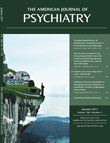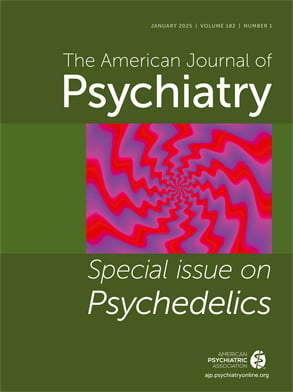T
o the E
ditor: I thank Drs. Müller and Banas for their interesting comments. Recently, I compiled an updated synopsis on the actions, effects, and efficacy of disulfiram in the treatment of alcohol dependence (
1). Disulfiram can be an effective agent for treating alcohol dependence, but this is limited to populations where there is high compliance with adhering to the medication (
2) or where subjects have been directly supervised (
2,
3). Since the behavioral effects of monitoring alcohol consumption and direct supervision are quite powerful in helping to maintain abstinence, it is these elements that are associated with any potential efficacy for disulfiram as a treatment for alcohol dependence. As such, its effect as a “psychological pill” is the predominant mode of action.
Disulfiram is associated with an increase in acetalde-hyde levels, which in and of itself appears to be reinforcing (
4). While I concur with Drs. Müller and Banas that disulfiram has been shown to inhibit dopamine beta-hydroxylase (
5), thereby increasing dopamine levels, presumably in the cortico-mesolimbic dopamine system (which is the primary circuit for the expression of alcohol reinforcement and abuse liability) (
6), this pharmacological effect is quite weak and is not its principal mode of action.
Furthermore, this effect of disulfiram on the cortico-mesolimbic dopamine circuit would be to increase, not decrease, reinforcement and abuse liability. In essence, the proposal would be for disulfiram to “substitute” for the effects of alcohol. Hence, both of its proposed mechanisms of action—on alcohol metabolism and on dopamine metabolism—would tend to argue against an effect as an anticraving agent. Furthermore, to my knowledge, there is no compelling body of research that would support the use of disulfiram as a substitute for alcohol. Indeed, there is no strong clinical evidence that a substitution agent would be an important treatment for alcohol dependence. Instead, the most important research studies have focused on developing medications that are neuromodulators of dopamine levels in the cortico-mesolimbic dopamine system, thereby decreasing the drive, urge, or propensity to use alcohol. These so-called anticraving agents are the hallmarks of promising new treatments for alcohol dependence.
Although preliminary evidence has been proposed for disulfiram as a treatment agent for cocaine dependence, this has not been established in subsequent studies, and the need for high doses, which have been associated with significant toxicity, is a safety limitation that precludes such use (
7). Furthermore, the potential effect of disulfiram on pathological gambling is based on a single case report (
8) and a letter to a journal editor (
9). It would, therefore, appear preliminary to propose disulfiram as an important treatment for pathological gambling.
In closing, disulfiram has a place in the treatment of alcohol dependence in individuals with high compliance or for whom medication adherence can be observed to occur during direct supervision. With such high monitoring and supervision, there are likely to be marked improvements in drinking behavior (
10), and it is reasonable to question whether disulfiram adds much over and above these behavioral approaches. In my view, it seems rather odd that a drug that has been used in practice for almost 60 years still requires even more studies to establish convincingly its efficacy for the treatment of alcohol dependence.

